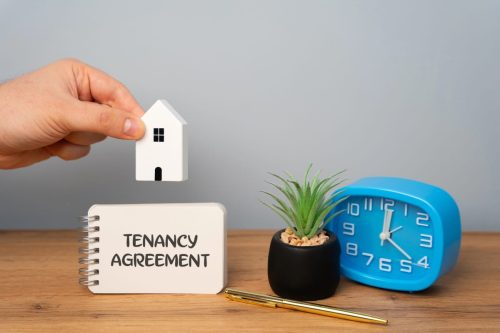Finding the perfect rental home can be daunting, but knowing what to look for when renting a house helps simplify the process. You must consider several factors, from the property’s condition to the tenancy agreement and location, to avoid potential pitfalls and secure a home that meets your needs.
This guide will help you understand what to look for in a rental property and the right questions to ask during your house-hunting journey.
1. Understanding your needs before house hunting
Before you dive into the rental market, take time to understand your needs. This will help you focus on rental properties that suit your lifestyle and budget.
• Start by defining your budget
This is one of the most important steps in house hunting, as it will save you time looking at rental properties outside your financial range. Consider rent, utilities, and other living expenses, such as internet and transport, and be realistic about what you can afford. As a general rule, keep your rent at no more than 30% of your monthly income.
• Next, identify your must-haves
Consider the number of bedrooms, bathrooms, and other amenities that are non-negotiable for you. For example, a pet-friendly rental property is essential if you have a furry friend. Other features might include air conditioning, a dishwasher, an enclosed garage, or an outdoor space.
• Finally, consider location and lifestyle
Do you need to be close to work, school, or public transport? Do you want a nearby neighbourhood with parks, shops, or dining options? Once you’ve narrowed your location preferences, you can look for rental properties that tick those boxes.
Answering these questions will help you narrow your property search and avoid wasting time on unsuitable rental properties.

2. What to look for when renting a house
Once you’ve found potential rental properties, it’s time to assess them thoroughly.
When inspecting a rental property, there are several key things you should look for to ensure the property is in good condition and safe to live in.
• First, assess the condition of the rental property
Ensure it meets your needs and appears well-maintained by the landlord. Look for any signs of damage to the rental property, such as cracked walls, mould, or water stains, which could indicate more significant issues like leaks or poor maintenance. Check the ceilings, floors, and corners of rooms, as these are common areas where damage may be more apparent.
• Next, check the safety features
Ensure the property has smoke alarms, secure doors and windows, and sufficient lighting in common areas. Security is paramount, especially in an unfamiliar neighbourhood. Don’t hesitate to ask the property manager if additional security measures are in place, such as alarms or CCTV systems.
• Consider the energy efficiency
Properties with solar panels and energy-efficient appliances can save on utility bills. Look for these features during your inspection to ensure you’re choosing a property that will be cost-effective in the long run.
• Don’t forget about outdoor space
Consider the size and maintenance of gardens or patios. Check whether it’s well-maintained and whether you’ll be responsible for upkeep.
• Lastly, check parking availability
Does the property have off-street parking, or will you need to apply for a permit to park on the street? Consider parking availability for guests and whether it’s convenient for your lifestyle.
The property manager will provide a detailed property condition report as part of your rental tenancy.
3. What to look for in a rental property location
Choosing the right location is just as important as finding the right property. The location can significantly impact your daily life and overall experience as a good tenant.
Here are some key aspects to consider:
• Neighbourhood safety
Start by researching the neighbourhood’s safety. Check local crime rates and speak to neighbours to get a feel for how secure the area is. If you’re moving to a new city, online forums and local community groups can be great resources for understanding neighbourhood safety.

• Noise levels
Noise can also be a dealbreaker. Visit the area at different times of the day to gauge the noise. Some streets may seem quiet during the day but could become much noisier at night due to nearby traffic or nightlife.
• Local facilities
Look at the availability of local shops, healthcare services, and schools. Walk around the neighbourhood to see if it has the amenities you’ll need, and consider how the proximity of these facilities might impact your daily routine.
• Public transport
Consider how accessible public transport options are. If you rely on public transport, ensure there are nearby stations or bus stops that align with your daily routine.
• Future developments
Planned construction or major infrastructure changes can affect your quality of life and property values. It’s a good idea to ask the property manager or real estate agent about any upcoming developments in the area.
These checks ensure your new rental home meets your current lifestyle and accommodates future changes.
4. Questions to ask at a house inspection
A house inspection is the perfect time to gather as much information as possible about the property. Here are some essential questions to ask during your inspection:
Are there any current issues with the property?
Ask about ongoing maintenance problems, such as leaks, plumbing issues, or pest infestations. This can give you insight into the property’s condition and whether the landlord is responsive to issues.
How are maintenance requests handled?
Find out if a process involved to submit maintenance requests.
Are utilities included in the rent?
It’s important to know whether you’ll be responsible for paying separately for water, gas, or electricity. This information will help you budget more accurately.
What changes can tenants make to the property?
Some landlords allow tenants to make minor changes like painting or hanging shelves, while others have strict rules about modifications. Be clear on this before signing the tenancy agreement.
These questions will help you make an informed decision and safeguard your rights as a tenant.
5. Questions to ask the real estate agent when renting
In addition to asking about the property, gathering key details about the lease and your tenancy agreement is crucial.
Some questions to ask the real estate agent include:
What is the length of the lease agreement?
Some landlords may prefer short-term leases, while others may offer longer terms with the option to renew. If you plan to stay in the rental property for several years, ensure there’s flexibility in renewing the lease. It’s important to understand these terms so you can plan accordingly.

How is the bond or deposit managed?
Find out how your bond is stored and the return process at the lease’s end. Ensure you understand when it will be returned and under what conditions, as this is often a significant upfront cost. Knowing this can help you get your deposit back in full.
How frequently can the rent be reviewed?
Rent increases can be stressful if unexpected, so it’s good to know how often they occur and the typical procedure. Understanding how and when rent increases are made will help you budget for the future.
Are there any restrictions?
Ask about restrictions, such as whether pets are allowed or if there are rules about renovations or redecorating. Understanding these upfront will help you avoid any potential disputes during your tenancy.
What should I know about property management?
Understanding how the property manager handles emergency and regular maintenance requests is important. Ask which issues will be addressed by them or the landlord and which you’ll need to fix yourself. Additionally, enquire about the schedule for rental inspections and what they involve.
These questions will help you avoid surprises before filling out the rental application.
Making informed decisions when renting a house
Being thorough during your house-hunting process by asking the right questions is vital to finding the right rental home for you.
By using our checklist and carefully considering the questions to ask a real estate agent when renting, you can make informed decisions and avoid potential pitfalls. Take the time to explore your options, and don’t hesitate to seek professional guidance.
Contact the team at HKY Real Estate to help you find the right rental property. Our experienced real estate agents and property managers across Perth are here to help you navigate the rental market and find your ideal home.
Have more questions?



